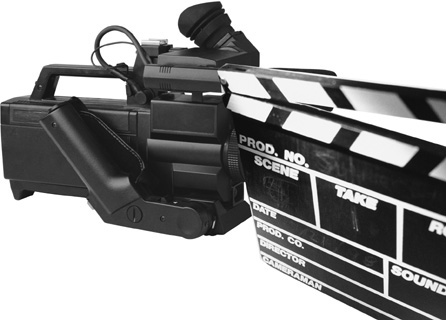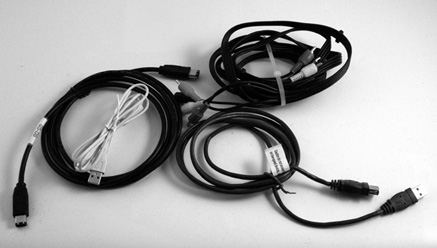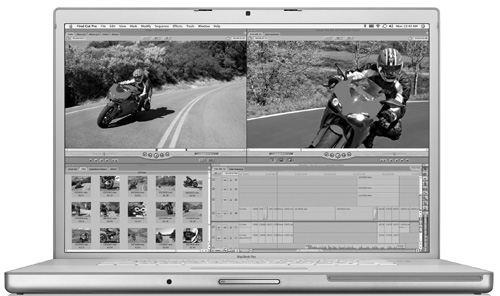IF YOU DID THE HOMEWORK assignment in Chapter 3, “Music Video Cookbook: The Ingredients,” and watched enough music videos to blur your vision, then it’s probably time to get started on your music video, right? Wrong. Before you go down the path of producing a music video, you need to determine what type of production it’s going to be. There are choices to be made that are somewhat determined by budget (actually, determined a lot by budget), by the level of professionalism you are looking to achieve, and by the amount of direct control you want to have over the video production process. Each of these choices poses advantages and disadvantages, so if you haven’t done so already, take the time to determine which production method will fit your particular music video goals. Also keep in mind that there is an additional choice that involves combining some of these suggested methods to complete your music video on time and on budget.
By far, the biggest motivation for doing it yourself is budget. After all, if you had unlimited funds, wouldn’t you hire the best professionals you could find to make your music video? (The correct answer is “yes,” in case you didn’t know.) But doing it yourself does not necessarily mean that you are making an amateur video. Remember, as I mentioned earlier in this book, you are the prosumer, and you can consider the “pro” part of prosumer to mean professional results instead of a previous definition of “pro” as meaning the producer.
Let’s face it—doing it yourself is going to be the cheapest way to go (although in these circles, it’s better to say “lower budget” and to avoid using the word “cheap”). Now, this assumes that you have all or most of the hardware and software you will need for production. If you need to equip a full music and video production project studio, even in a bedroom in your house, and you are starting with nothing, then your startup costs will be quite different. But, as stated earlier in the book, I’m assuming you already have a head start on all of this.
So, back to the budget. Providing you have the basics, there will still be some additional expenses, which may include costs for the following items (some of which are shown in Figure 4.1).

Figure 4.1. Among the items you’ll need to consider in your budget are extras like tapes (or other storage) and batteries.
For equipment and accessories, you may need the following:
Storage—MiniDV tapes, extra hard drives, and so on
Lighting, reflectors—If you decide you need a more professional look indoors
Lenses and filters—Not an absolute necessity, but nice to have around
Extra power in the form of batteries
Cables and adaptors—For audio, video, and electric (see Figure 4.2)
For the cast, you may need these items:
Wardrobe
Make-up
Food or catering
Salary (didn’t anyone mention that possibility?)
For the crew you may need these amenities:
Food or catering
Salary (didn’t anyone mention that possibility?)
Didn’t anyone mention salary? Okay, for the sake of argument, let’s assume that everyone is going to pitch in for free. This will be a major variable based upon the type of production you’re doing, the level of experience of the people involved, and obvious issues, such as whether everyone involved is an integral part of the project—the band, the manager, the roadies, and so on.
In a do-it-yourself project, many of these items will be up to your sole discretion. Of the categories just mentioned, the first one—equipment and accessories—may have items that are unavoidable, such as batteries, cables, and so on. The other categories may either be completely unnecessary or an absolute requirement, such as wardrobe. These items will be determined by your script and whether you need any wardrobe changes or additional crew members.
There was a time that the idea of self-producing a music video with professional-looking (and sounding) results was impossible. That was before we had the tools that are available to us today. It may sound like a cliché, but you have more computer power on your desktop than the astronauts had available to them on their moon landing (and all you’re doing is making a music video—you’re not even attempting to get into orbit). Moreover, laptop computers have become so powerful that they provide you with the capability to take your production on the road (see Figure 4.3).
The tools, in the form of hardware and software, clearly create an advantage for the do-it-yourselfer of today and more than that, make it even possible. See Chapter 5, “Tools for Do-It-Yourselfers,” for a more in-depth look at audio and video production tools.
Maybe you’re not a control freak, but if you’re technically and creatively savvy, you can be a control geek. (Combine these with ambition, and you could be the guy in Figure 4.4.) A clear advantage in doing it yourself is that you will have more control. At the very least, you are the director and in some cases, the producer, the writer, the camera operator, the editor, and so on. Sure, you might have friends or colleagues who take on some of these tasks. But when you’re in charge, you’re in control. So add another advantage to the DIY (do it yourself) column.
An argument can be made that if you’re doing an expensive professional production, you might be in control as well. True, but if you are sharing the expense with others in a team environment (say, members of a band), then you will have more chefs in the kitchen, chefs that are much more vocal because they have dollars at stake.
There’s nothing like on-the-job training, and making a music video will give you plenty of it. When you think about the disciplines involved—audio recording and video production to name a couple—you are only scratching the surface of music video production. There is also the writing, the casting, wardrobe, and many other tasks that will challenge your creativity and technical chops.
If you’re an accomplished music video director/producer, then you already know these things, mostly from experience. But if you’re just starting out, you will need to “push the envelope” and work on tasks you may never have attempted previously. In addition to books, such as this one, you will benefit by reading about other parts of the process in more specialized areas. For example, what do you know about make-up? Special effects? Camera moves? In addition to this type of self-education, there is the prospect of doing a lot of research on the Internet—before you begin your production, as well as during it, to get information that is very up-to-date. Even if your first project does not meet your expectations, you will have gained valuable experience you can use on your second production. Hiring a professional crew is certainly great, but it won’t give you as much direct, hands-on experience as a DIY production does.
After you’ve got at least one music video project under your belt, you can honestly say that you’re a music video director and/or producer. You can add it to your resume, put in on your business card, and introduce yourself that way at cocktail parties. I would not recommend doing so until you have a production that you think is very deserving of the director or producer title. But, at some point in your career (even if it’s not your life-long goal to direct music videos), you will be able to tout your music video production capabilities.
A DIY production becomes more than an item on your resume when you realize that what you are really creating is a reel. A reel these days means a digital file rather than a physical reel that spins around and around (see Figure 4.5). But then again, many refer to their latest CD as their new record, a term that at one time meant something vinyl that also spun around and around. Nevertheless, the clips that you continue to build up in time will become part of your reel or portfolio or demo—whatever name you want to call it.
Additionally, because you are thinking about posting it on the Internet, you will automatically have a promotional and marketing tool you can use to your heart’s content.
As mentioned earlier, there are advantages and disadvantages in each method of production, and using a student filmmaker is no exception. And just like before with the terms “reel” and “record,” the term filmmaker may be a bit of a misnomer. In most cases, I am really talking about video, which ironically enough, is sometimes used to make professional films. Nevertheless, I will stick with the term student filmmaker or film student—as this is the term used in most colleges and film schools.
The clear advantage of teaming up with student filmmakers is that they already have some training and experience, not to mention the confidence that comes with having that experience. They are likely two steps ahead of you, assuming that you’ve concentrated most of your efforts on songwriting. The film student already knows about camera moves, lighting, file formats, aspect ratios, and post-production—things that you may know something about but not enough to call yourself experienced. Teaming up with a student filmmaker might yield more professional results and, at the very least, save you a lot of time in every aspect of the production.
Why would a film student want to work with you in the first place? Well, he or she may not. This part of the formula relies on the strength of your act, persuasive capabilities, as well as your ability to network. Getting in touch with film schools and posting your project may be one way to find a student filmmaker. Another is to use the Internet to post an ad for a student filmmaker on websites such as www.craigslist.com or www.mandy.com. You could offer the film student some amount of composing for his productions as a trade for his services. And remember that you can also sweeten your offer with some amount of cash, even in a low-budget production.
A natural built-in advantage to teaming up with a film student is access to equipment that you don’t have to buy or rent. The filmmaker may not have a full audio production studio, but hopefully you do. Where the student filmmaker comes in is on the video side of things, and she may come not only with a camera, but also with lighting, reflectors, additional lenses, and so on. But it doesn’t stop there. If the student filmmaker wants a lot of involvement in the project, you can enlist her to participate in everything from pre-production to final product. Your particular needs may vary as much as the student filmmaker’s capabilities do, so approach this method with some flexibility.
One problem with the DIY method is that you often work alone and may not have anyone to bounce your ideas off of—a sounding board of sorts. With a film student, you automatically have a sounding board with whom you can bounce, debate, discuss, and challenge ideas. This is not to say you won’t have this advantage in other methods, except that the DIY method may not present as much opportunity to do so.
Just as in the case of watching other types of music videos outside of your particular genre, working closely with someone like a student filmmaker can help you “think outside the box” and reveal ideas you would not ordinarily think of.
Sometimes a student filmmaker comes with other student filmmakers. If there is enough interest in your project, it’s not out of the realm of possibility to enlist other film students in executing many of the tasks from pre- to post-production. You could potentially have more than one student to help you—you could have a crew, again, depending on your persuasive abilities and the quality of your music. You might even have a scenario in which you hand off the directing chores to student filmmaker number one while you take on the role of executive producer. It feels good, doesn’t it? Don’t rule it out.
Film students may have a number of connections that can be beneficial to you. It may be that they know someone in the business. Or maybe they know someone who knows someone. Although it is totally possible that they know no one at all (of any consequence), at the very least, you have networking potential here that you may not have in the DIY scenario. Many composers today are working with filmmakers whom they either knew from film school or worked with early on. Those relationships are important. If you think you may be doing more music videos in the future, these relationships should be nurtured. When you look at feature films, as an example, you’ll notice that directors seem to work with some of the people—especially composers—time after time. If there seems to be synergy between you and the student filmmaker, think in terms that are beyond the scope of this particular music video. You could, in fact, be working in a professional situation with this person years from now, and during those years, the connections that you have will continue to grow.
As always, use the Internet as a resource, too. Just by Googling “student filmmaker,” I came across a great site called www.studentfilmmakers.com, which can be a great jumping off point for increasing the size and reach of your network.
Now you transcend from low/no-budget projects into the “how much is that going to cost?” territory. If your budget and inclination allows for it, using a pro might be the way to go. As with the first two scenarios, this choice poses advantages and disadvantages.
Based on your budget, you may be able to hire a professional to help you with your music video. Also based on your budget, you might be hiring one videographer or a production company that has a full staff of professionals. For the sake of clarity, I’ll use the word “professional” to mean either one, unless otherwise specified.

One assumption you can probably make is that hiring a professional will yield professional results—more professional than the other alternatives. In most respects this is true, but there are other things to consider that go beyond the word professional.
Communication: When you first interview a professional, get a real sense of how your communication is flowing. If it seems at all awkward, this professional may not be a good fit for you. No matter how much talent the professional might have, if you don’t have excellent communication, nothing else will be successful.
Synergy: Make sure you are “on the same page” or on the same “wavelength.” Although this has a lot to do with communication, it goes beyond that to include other issues. Can you work with this person? Does he have an aesthetic view, a sense of humor, and a work ethic similar to yours? If you’re not comfortable at the first meeting, it’s unlikely that you’ll be comfortable later on.
Musical aptitude: Melody, harmony, rhythm—these and many other musical techniques are something you need to know. Of these, if your professional had only a sense of rhythm, your project would benefit greatly. Editing and even camera moves have a sense of rhythm to them. Combine this with the fact that your entire focus is music, so you want the pulse and the heartbeat of your music video as a whole to have good rhythm—which leads to the next point.
Experience with music videos: Your professional may have done a ton of corporate videos, television commercials, public service spots, and infomercials, but if music videos are not part of the pro’s portfolio, you might be going down the wrong path. This is not to say that it’s impossible for a pro with another specialty to produce a good music video. But because people do tend to specialize, I would recommend hiring a producer with music video experience, just as I would prefer that a corporate video be produced by a specialist in corporate video, and so on.
Trust: All of these considerations, combined, should give a feeling of confidence and trust. This will be very necessary when you begin shooting, for your energies should focus on the creative aspects of the project, not on any of the preceding issues. Although no one producer may be perfect, you are better off not settling for something less than “very good.” It is, after all, your budget.
This is a potential advantage when hiring a professional. I say potential because although the pro can likely work faster than you on some of these tasks, turn-around time also depends on the current schedule of the pro or production company you’re hiring. This is something to talk about directly in your initial meeting. If his or her schedule is full and yours in on a deadline, you don’t have a match. If, on the other hand, the pro can get you in on your schedule, the tasks—especially post-production—should go faster and give you a good turn-around time.
Similar to the scenario of the student filmmaker, using an outside resource—in this case, a professional—provides a means of having someone to give you feedback, not only before the shoot, but after it as well. And in this case, your sounding board has a great deal of experience with which to give you ideas, techniques, and who knows—maybe even a connection or two for distribution. Working in isolation can work well, but working as part of a team (providing the synergy is there) can make it even better.
You may be hiring one producer/director for your project or a team consisting of writers, cameramen, soundman, film editors, and more. It is likely that you are in the former group (one producer/director) rather than the latter. But if it is a production company—even a small one—ask questions about the structure of their organization and whether other people can be utilized at a reasonable cost. This not only provides faster turn-around time, it gives you the advantage of people who specialize in a particular discipline.
The professional comes with a great deal of technical knowledge, knowledge that you may not have about the variety of formats, file types, and other technical “gotchas.” As I point out in the earlier DIY section, these are things you can certainly learn yourself. But if you are more creatively gifted than technically astute, this built-in advantage to using a professional may be your cup of tea.
One overarching guideline to choosing your production method is how it will be used. This book focuses on posting your video on the Internet. You may have fantasies about getting it placed on VH1 or MTV as well. If that’s the case, the homegrown production may not yield a music video that is broadcast-ready. I say may because it certainly is possible to get to this level of professional quality on your own. But in most cases, a goal of a broadcast video would be best served by hiring an outside professional.
Again and again, the issue of budget will rear its head. That’s because more than any other decision-driver, budget is the master of all. All other considerations aside, if you can’t afford to hire a professional, that means some of the points in this chapter are good to know but somewhat inapplicable if you don’t have the necessary funds. Yet, sometimes the reverse is true. You may have the budget but a yearning desire to do something on your own—to be your own producer/director, writer, and editor.
The key is to know these things in advance, before you go to the production company for an initial meeting. One of first things they will ask you (instead of telling you how much things cost) is, “What is your budget?” The answer to that will dictate much you can and cannot do.




